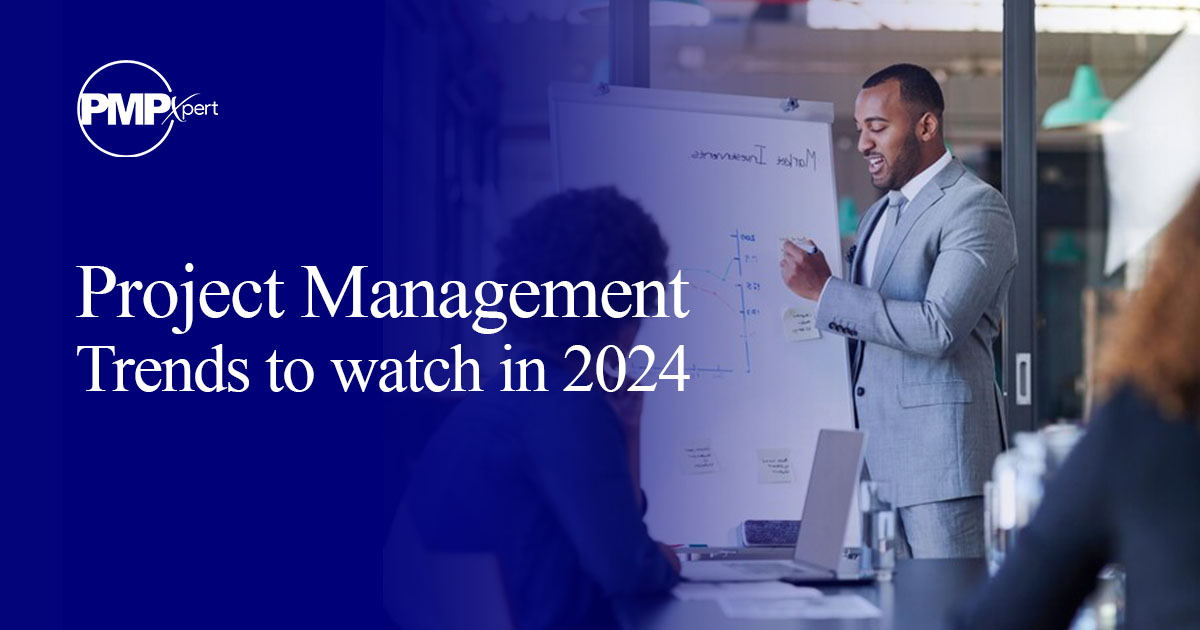“The only constant in life is change” as observed by Heraclitus, the ancient Greek philosopher. This quote rings especially true in the fast-paced world of project management.
The world of project management has undergone a dramatic transformation. Gone are the days of relying solely on scribbles on sticky notes and whiteboards. Today’s project managers now have access to sophisticated software tools that have completely changed how projects are planned, executed, and delivered.
As technology evolves and the business ecosystem shifts, project managers need to stay ahead of the curve to ensure project success.
So, what trends are shaping the future of project management in 2024?
Here are five key areas to watch:
The Rise of AI and Machine Learning (ML):
Artificial intelligence and machine learning are no longer science fiction. They are rapidly transforming project management by:
Predicting project risks and roadblocks: Risk management is one very important aspect every project manager must pay attention to and the advent of AI and ML tools plays a very huge role in this today. AI algorithms can analyze historical data to identify potential problems before they derail your project.
By analyzing these vast amounts of historical project data, AI can uncover hidden threats and predict what might trigger them.
This allows project managers to take proactive measures, like securing backup resources or implementing contingency plans, before the risk even occurs.
ML algorithms continuously learn and improve with new data, ensuring risk assessments stay relevant and adaptable. This results in reduced project delays, better resource allocation, and ultimately, a higher chance of project success.
However, AI doesn’t replace the human element. Project managers still need their judgement to interpret AI insights, effectively communicate risks to stakeholders, and adapt to unforeseen situations. The future of risk management looks like a powerful synergy between advanced technology and human expertise.
Automating repetitive tasks: Project managers can finally say goodbye to scheduling headaches! AI-powered assistants analyze team calendars and suggest optimal meeting times, eliminating the need for tedious back-and-forth emails and ensuring everyone’s availability. But the benefits go beyond scheduling. AI can also generate reports by automatically pulling data and creating insightful visualizations.
This frees managers from the time-consuming task of manual data crunching, allowing them to focus on analyzing the data and making informed decisions.
Furthermore, AI can automate repetitive tasks like sending status updates, assigning routine work, and managing approvals. This frees up valuable time and mental space, empowering project managers to focus on strategic work and lead their teams to success.
Data-Driven Decision Making:
Project management is no longer just about gut instinct. In 2024, data is king.
Project management software with advanced analytics dashboards: This will allow project managers to track progress, identify trends, and make data-driven decisions to improve project outcomes.
These dashboards provide real-time data visualizations, allowing you to track progress, identify emerging trends, and spot potential roadblocks before they derail your project. Imagine seeing resource allocation imbalances, task completion rates, and even team member workload at a glance. This empowers you to make data-driven decisions, like reassigning tasks for better efficiency or adjusting project timelines proactively. Analytics dashboards transform project management from guesswork to a strategic, data-driven approach, boosting your chances of project success.
Integration with business intelligence (BI) tools: Integrating project management software with Business Intelligence (BI) tools breaks down data barriers. This creates a holistic view of project performance, allowing you to see how your project impacts broader business goals. Imagine analyzing project costs alongside sales figures or visualizing resource allocation across different departments. This empowers strategic decision-making. You can identify areas where resources are under-utilized, optimize project budgets based on real-time data, and ensure your project aligns perfectly with your organization’s overall objectives. BI integration transforms project management from a standalone activity to a strategic driver of business success.
Increase In Hybrid Mode of Work:
The pandemic pushed companies to let employees work remotely for safety reasons. Now, many companies are trying to bring people back to the office, but some employees prefer the flexibility of working from home. This has resulted in the adoption of the hybrid mode of work. Project managers in 2024 will need to adapt their leadership styles to be effective in this new environment.
Building and maintaining successful teams who are not in the same geographical location requires investment in robust collaboration tools. Video conferencing platforms will be essential for face-to-face interaction, while instant messaging apps will facilitate real-time communication throughout the workday.
However, technology is just one piece of the puzzle. Project managers also need to prioritize promoting a virtual environment built on trust and psychological safety. This means creating a space where team members feel comfortable sharing ideas, concerns, and even making mistakes. Encouraging open communication and celebrating successes, both big and small, will be crucial for building strong team spirit and ensuring project success in this new era of hybrid work.
The Need For Project Managers with High Emotional Intelligence:
The World Economic Forum’s “Future of Jobs” report highlights a growing need for emotional intelligence (EQ) and social skills in leaders, including project managers. This makes sense because project success hinges on managing people effectively. Understanding your team is key to good management.
Emotional intelligence equips project managers with the skills to understand their team members’ emotions, motivations, and working styles. This allows them to build trust, handle interpersonal challenges constructively, and create a positive team.
The rise of remote work further emphasizes the importance of EQ. Building connections and empathizing with team members, even when they’re not physically present, is crucial in this new work environment. In short, project management is evolving beyond just technical skills. The ability to lead with empathy, build strong relationships, and navigate complex human dynamics is becoming increasingly valuable for project managers who want to drive success in today’s work environment.
Increased Focus on Change Management:
There has been a high demand for adaptable project managers in recent times because of the ever changing scope of work. In fact, the rise of remote and hybrid work models, while offering flexibility, presents new hurdles for project managers.
Collaboration and communication can become trickier when teams are geographically dispersed. Without proactive measures, these challenges can derail even the best project plans.
These dynamics have made it very important for Project Managers to acquire change management skills to navigate the inevitable, manage stakeholder expectations that might shift, and ensure a smooth delivery of the final project.
This is especially important considering the current global economic uncertainties impacting businesses worldwide.
Effective change management helps project managers anticipate and address communication gaps and collaboration challenges, ensuring a smooth project journey and successful delivery.
By developing effective communication strategies, project managers can keep all stakeholders informed and engaged throughout the change process. This open communication minimizes resistance to changes and ultimately aids the successful completion of a project, even when things don’t always go exactly according to plan.
Project management in 2024 is all about getting smarter and more adaptable. Sure, the basics like organization and leadership skills are still key, but there’s a tech twist! AI can help avoid problems before they start, and data lets you make informed decisions.
When project managers constantly update their skills and embrace these trends, they can unlock a whole new level of efficiency, and success. The future is bright for project managers who can combine tech expertise with human strengths to navigate challenges and deliver amazing results!

